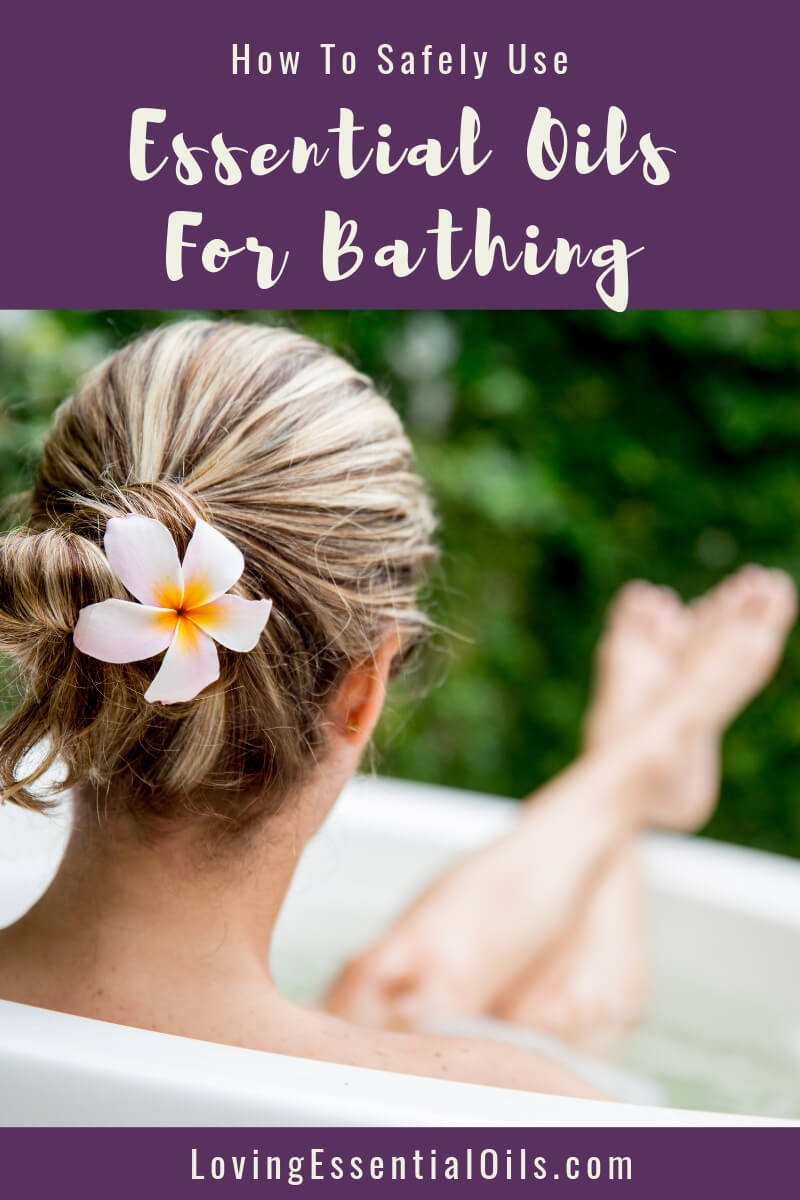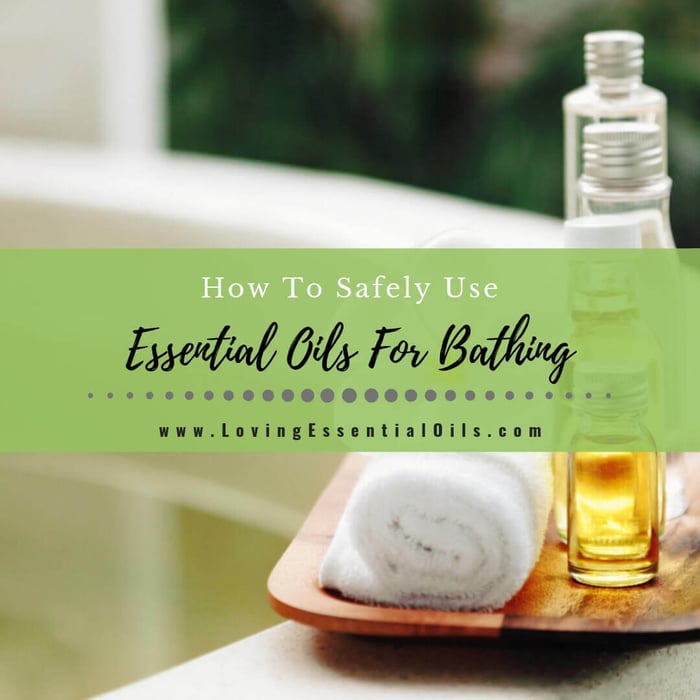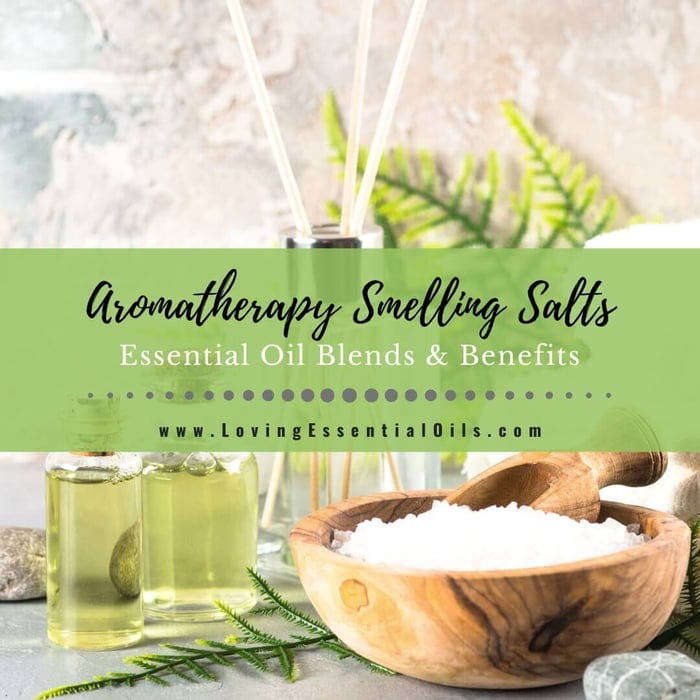Do you know how to use essential oils for bathing? There are many benefits of using essential oils for bathing. Bathing with essential oils can calm the mind and body and relieve aches and pains.
You will be able to enjoy aromatherapy benefits from inhaling the aroma as well as having the oils make contact with your skin and being absorbed for therapeutic effects while soaking in the aromatherapy bath water.
Aromatherapy is a powerful way to melt stress and make life more enjoyable. When you are relaxed and less stressed your body is more in balance.
Benefits of Bathing with Essential Oils
Aromatherapy baths are one of the most relaxing things you can do. They’re great for getting rid of aches and pains. Essential oils will hydrate your skin while adding a calming scent as well!
What are some benefits of using essential oils in my bath? Here are just a few benefits of bathing with essential oils:
- Relax the mind and body
- Promote circulation
- Soothe and nourish skin
- Ease muscle aches and joint discomforts
- Diminish menstrual cramps
- Relieve respiratory ailments
- Boost mood and reduce stress levels
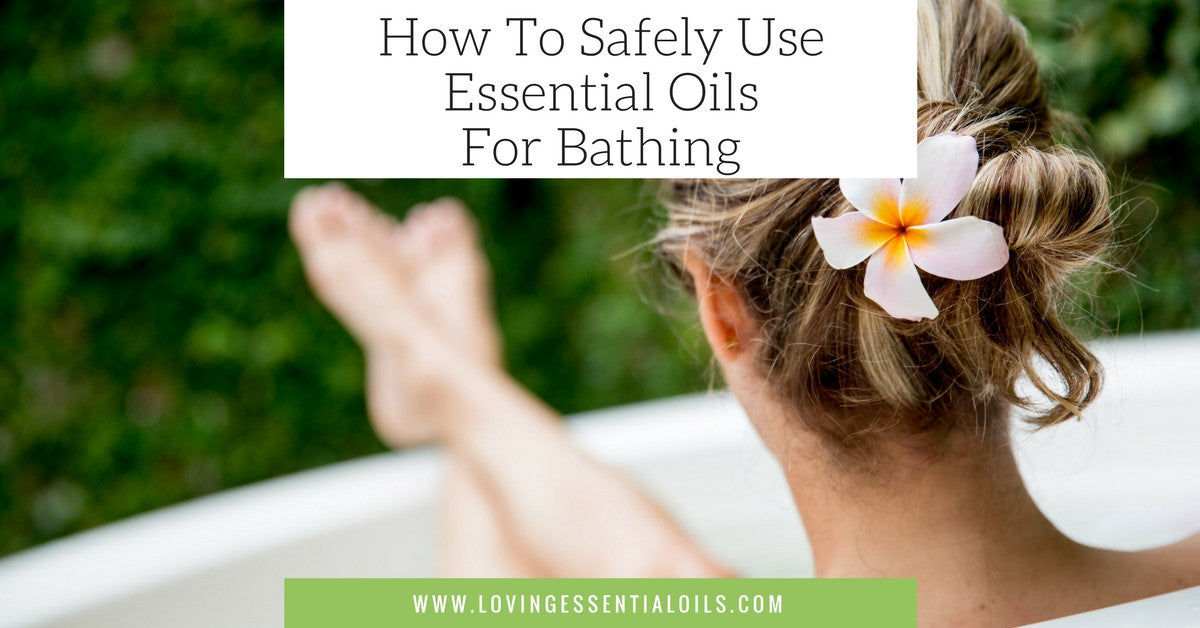
How to Use Essential Oils for Bathing Safely
Adding essential oils to a bath is a simple way to enhance your bathing experience but it must be done right. You can't just drop any oil into the bath and expect positive results. Essential oils are not water soluble.
Just adding essential oils to the bath is not usually very effective because they will float to the top of the water and stick to the tub or concentrate on your skin. Not only would that be wasteful but this can cause irritation to your skin.
You can prevent essential oils from floating to the top undiluted by simply mixing them into carrier oil or Castile soap. Here is how to create you own aromatherapy bath at home.
Step 1 - Diluting Essential Oils for Bath Time:
Add 3-6 drops of essential oils into 1 tablespoon of Castile soap (unscented) or carrier oil. The two best carrier oils for bathing are fractionated coconut oil or jojoba oil, in my opinion.
Step 2 - Preparing Bathwater:
Run bath water to a suitable temperature for your skin. While filling your tub you can add in Epsom salt or Himalayan salt for additional benefits, 1/4 cup to 1/2 cup. It is best to add your salts to running bathwater so the salt can start to dissolve.
Step 3 - Mixing Essential Oils into Bath:
Add your essential oil mixture to bathwater once filled, swirl water with hand to blend. Carefully get into bath. Don't wait, the warm water will cause the essential oils to start evaporating. You may want to close the door to keep the aroma in your bathroom for your aromatic pleasure.
Read More: Diluting Essential Oils
Note: Be careful entering and exiting bath as the oils may make the tub slippery. Whenever I use oils in the shower or bath, I make sure to tell my husband so he doesn't unknowingly jump in the shower and slip. To quickly clean up, throw some baking soda in the bath tub and give it a quick scrub down.
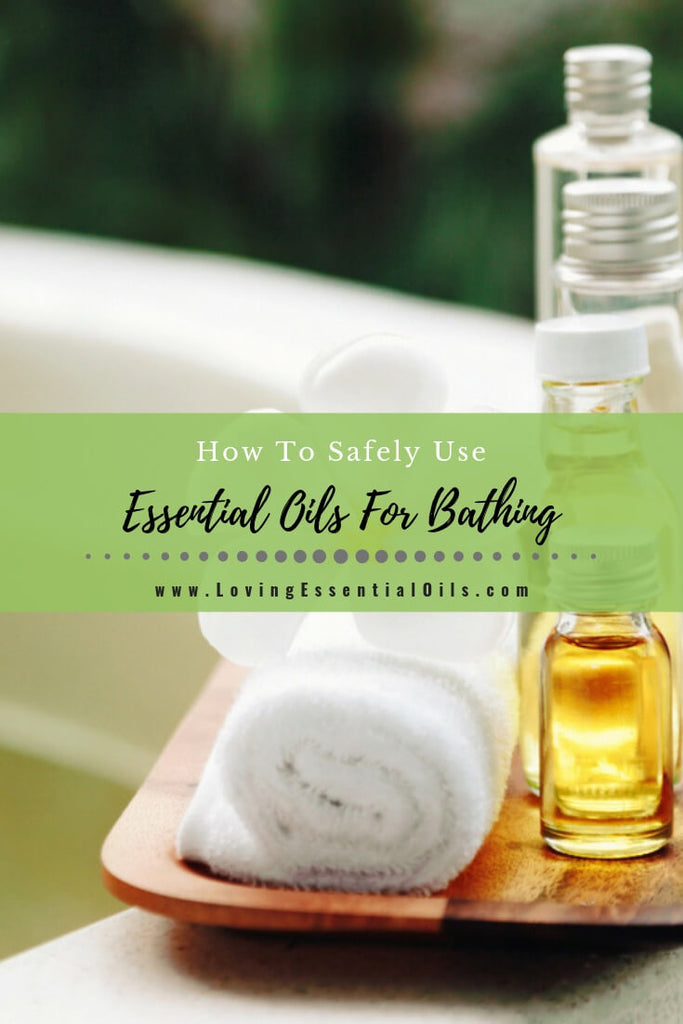
What Essential Oil Should I Use for Bathing?
When considering what essential oil you want to use in your aromatherapy bath, be sure to keep in mind what you hope to gain from your bath. Do you want to relax, soothe sore muscles, uplift your mood, or calm an upset stomach?
The best essential oil to use will depend on your desired effects you are looking to receive from your bath.
Is it close to bedtime? Try lavender, ylang ylang, or chamomile for a relaxing bath.
Morning time bath? Get energized with eucalyptus or any citrus oil.
Having pain and discomfort in your muscles or joints? Try juniper berry or sweet marjoram to soothe your aches, plus add in some Epsom salt.
Picking the best essential oil for your bath will also depend on what essential oils you have available in your collection.
10 Best Essential Oils for Bath Time
What you hope to gain from the bath will help you determine what type of oils you will pick. Also, think about what scent you would like to enjoy during your bath.
- Lavender
- Sweet Orange
- Roman Chamomile
- Cedarwood
- Frankincense
- Sweet Marjoram
- Tangerine
- Cypress
- Clary Sage
- Grapefruit
There are many essential oils that are calming and relaxing, as well as energizing and uplifting, get more ideas here.
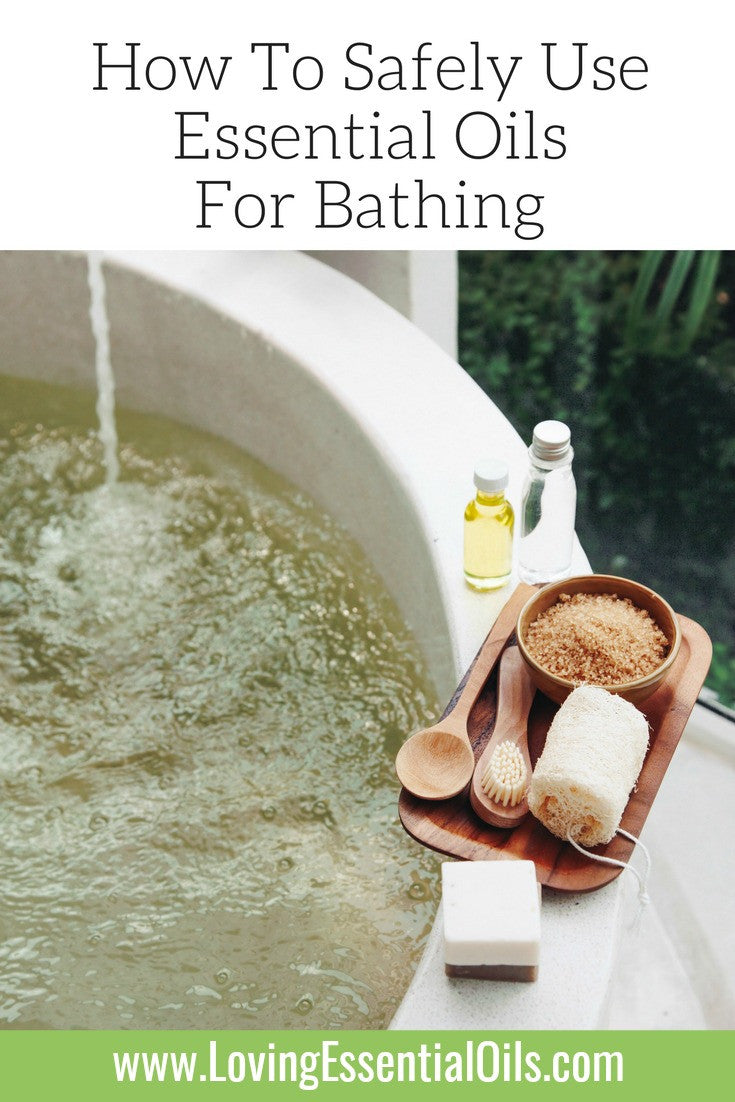
What Essential Oils Should I Avoid in the Bath?
There are some essential oils that should not be used during bathing because these oils are skin irritants and considered hot oils. It is best to avoid these during bathing. They include:
- Cinnamon
- Cassia
- Clove
- Oregano
- Thyme
- Wintergreen
Peppermint Essential Oil for Bathing
Peppermint essential oil is a favorite oil but in the bath it may irritate and burn the skin. Best to avoid this one, or only use a drop or two because too much peppermint oil in bath can be unpleasant, especially to the private and sensitive parts of the body.
Geranium, Ylang Ylang, and Rose are lovely but you may find 1 drop is enough, more may be too overwhelming and may cause a headache or nausea while bathing.
More Ways to Use Essential Oils for Bathing
Essential oils are a natural and versatile way to improve your bathing experience. Add a few drops of oil to your bathtub before you get in, or create a luxurious bath salt blends by combining essential oils with epsom salt and a carrier oil.
You can also add a few drops of oil to your soap or shampoo for an extra-invigorating cleanse. Here are some more bathing tips and recipes with essential oils:
- Essential Oil Detox Bath
- Bath Oil Blends
- How to Use Essential Oils in the Shower
- Bath Salt Blends
- How to Use Frankincense Oil in the Bath
For a relaxing bath, consider adding lavender oil to promote a sense of calm. If you're looking for a pick-me-up, try using grapefruit oil to boost energy levels. No matter what your desired outcome is, there's an essential oil that can help you achieve it. So go ahead and give them a try the next time you draw yourself a bath.
Essential Oil Combinations for Bathtime
Essential oils can be a great addition to your bathtime routine. Not only do they provide a pleasant scent, but they can also help to improve your mood and promote relaxation. When choosing essential oils for your bath, it is important to consider the properties of each oil.
For example, lavender oil is known for its calming effects, while lemon oil can help to invigorate and refresh. You may also want to consider the benefits of combining different oils.
There are endless possibilities when it comes to essential oil combinations for the bath. Whether you're looking to relax, rejuvenate, or simply enjoy a pleasant scent, there's a combination that's perfect for you. Here are a few of our favorites:
For Relaxation:
Add a few drops each of lavender and chamomile essential oils to your bathtub before getting in. The calming scents will help you to unwind and relax. You can also add a few drops of ylang ylang oil to this mixture for an extra bit of stress relief.
For Rejuvenation:
Mix together grapefruit, lemon, and rosemary essential oils for a refreshing and uplifting blend. This combination is perfect for mornings, as the citrus scents will help to wake you up and the rosemary will give you an extra boost of energy. You can also add a few drops of peppermint oil to this blend if you're feeling particularly sluggish.
For a Pleasant Scent:
If you're just looking to enjoy a nice smell, try adding a combination of any two or three of your favorite essential oils to your bathwater. Some great options include lavender, orange, and lemongrass.
Or, for a truly unique scent, try combining one part rose oil with two parts sandalwood oil. Whichever combination you choose, be sure to add only a few drops of each oil so that the scent isn't overpowering.
For Breathing:
Adding a few drops of eucalyptus and lavender oil to your bath can help to clear your sinuses and ease congestion.
Ultimately, there is no wrong way to use essential oils in your bath. Experiment with different combinations until you find a scent that promotes relaxation and well-being.
You can read more at Tisserand Institute on the topic of dispersing essential oils.
Share on Pinterest
